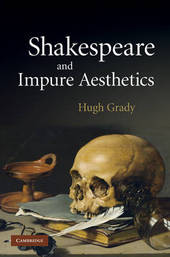
|
Shakespeare and Impure Aesthetics
Hardback
Main Details
| Title |
Shakespeare and Impure Aesthetics
|
| Authors and Contributors |
By (author) Hugh Grady
|
| Physical Properties |
| Format:Hardback | | Pages:272 | | Dimensions(mm): Height 235,Width 158 |
|
| Category/Genre | Literary studies - c 1500 to c 1800 |
|---|
| ISBN/Barcode |
9780521514750
|
| Classifications | Dewey:822.33 |
|---|
| Audience | | Professional & Vocational | |
|---|
|
Publishing Details |
| Publisher |
Cambridge University Press
|
| Imprint |
Cambridge University Press
|
| Publication Date |
13 August 2009 |
| Publication Country |
United Kingdom
|
Description
Shakespeare and Impure Aesthetics explores ideas about art implicit in Shakespeare's plays and defines specific Shakespearean aesthetic practices in his use of desire, death and mourning as resources for art. Hugh Grady draws on a tradition of aesthetic theorists who understand art as always formed in a specific historical moment but as also distanced from its context through its form and Utopian projections. Grady sees A Midsummer Night's Dream, Timon of Athens, Hamlet, and Romeo and Juliet as displaying these qualities, showing aesthetic theory's usefulness for close readings of the plays. The book argues that such social-minded 'impure aesthetics' can revitalize the political impulses of the new historicism while opening up a new aesthetic dimension in the current discussion of Shakespeare.
Author Biography
Hugh Grady is Professor of English at Arcadia University.
Reviews"Grady offers a timely corrective to those who continue to view the aesthetic as an outmoded and idealized category - a straw target that was ritually bowled over in the first wave of cultural theory. Instead, he offers 'impure aesthetics' as a 'place-holder' for that which is 'repressed elsewhere in the system'. In the process he repositions the aesthetic as a dynamic and critical concept - one that post-dates Shakespeare's plays but continues to prove crucially informative in our reinterpretation of the playwright's work." -Professor John J. Joughin, University of Central Lancashire "...Grady continues his important project of investigating the formation of modern subjectivity in Shakespeare. This time it is in relation to aesthetics - a subject...Recommended" -A.DiMatteo, New York Institute of Technology
|